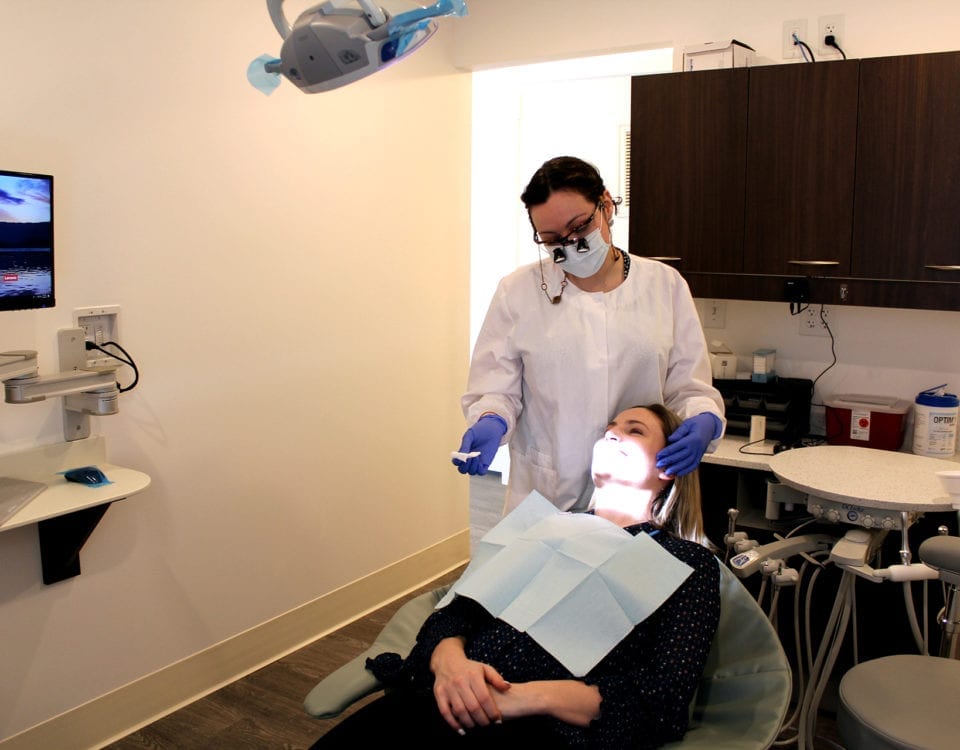The Low Down on Root Canals
Nothing to Fear Here – Easing Dental Anxiety
February 20, 2020COVID
April 29, 2020Root canals are used to repair and save teeth that are badly decayed or that have become infected. This will stop the spread of decay and eliminate discomfort and pain. The root canal is that cavity within the center of the tooth that protects the tooth’s nerve. It’s the job of the nerve to notify you when something is cold or hot. When a nerve is damaged it breaks down and bacteria begin to grow and multiply. This is what causes the infection or what is known as an abscessed tooth.
What is an Abscess Tooth?
An abscess is a pocket filled with pus that forms at the end of the roots of a tooth. This happens when an infection spreads all the way past the ends of the roots. This can cause swelling in your face neck or head as well as bone loss at the tip of the tooth’s root. A bad infection can cause further damage as drainage becomes a problem. Eventually, a hole can occur through the side of the tooth and the drainage will affect the gums and cheek.
How Did We Get Here?
I bet you’re wondering how a tooth’s nerve gets damaged in the first place. A tooth’s nerve and pulp, (the soft area within the root canal) can get infected due to deep decay, repeated dental procedures on a tooth, large fillings or a cracked or chipped tooth caused by trauma to the face.
What to Expect During A Root Canal
A root canal can require more than one office visit. The initial step is to take an X-ray to get an idea of the shape of the root canals and to determine if there are any signs of infection in the surrounding bone. You will receive a local anesthetic to numb the area near the tooth. This will help put you at ease and ensure you don’t experience unbearable discomfort.
After this, the dentist will get to work removing decayed nerve tissue and related debris from the area. Once the canal is cleaned and free of debris, it is sealed. This process can be prolonged, depending on how bad the infection is. It may be necessary to wait a week or so before sealing the tooth in the event that medication needs to be put inside the tooth to clear it up.
Anxious About Visiting the Dentist? No Worries, We Can Help!
We understand that not everyone is very excited to visit the dentist. Our friendly and compassionate staff has ensured that our office is warm and inviting so you can feel at ease. In addition, we are proud to offer sedation dentistry, which uses medication to help patients relax during dental procedures. It is safe and we will work with you to determine the most appropriate sedation option for you. Sedation dentistry not only helps you relax, but it can increase comfort, control gag reflex and calm any phobias related to dental procedures. Keep in mind that sedation dentistry isn’t for everyone. If you have underlying issues, such as high blood pressure, diabetes or heart disease, be sure to check with your physician ahead of time.
What Happens if You Don’t Treat an Abscess Tooth?
An infected tooth will not heal on its own. Left untreated, the infection can spread to other areas of your body including your jaw, brain, and bloodstream which can lead to bigger health complications like strokes, heart attacks, and life-threatening sepsis. Sepsis is caused when the body’s response to an infection is unbalanced. Normally, the body releases chemicals to fight infection. Sepsis can progress quickly into septic shock and can cause damage to major organs or become fatal. It is important to take your overall oral health seriously.
Make an Appointment
If you are experiencing severe toothache pain while chewing or applying pressure or prolonged sensitivity to hot or cold temperatures, you may be a good candidate for a root canal. Some other signs are swelling and tenderness near the gums or discoloration or darkening of the tooth. To determine the best course of action for you, schedule an appointment with us. Together, we can get to the bottom of the issue and proactively determine the best course of action for you.


